John Janaro's Blog, page 50
July 31, 2023
The Beginnings of Ignatius Loyola’s Great Vocation
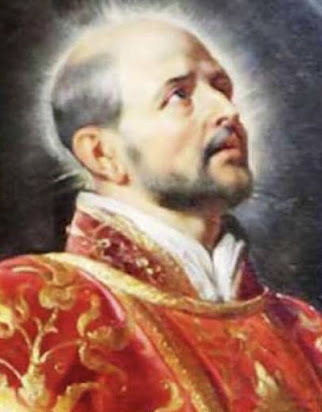 There are many wonderful stories from the life of Saint Ignatius Loyola (July 31) as he followed the Lord’s call (together with his earliest companions) to found and foster the emergence of a singular missionary charism in the life of the Church: the Society of Jesus.
There are many wonderful stories from the life of Saint Ignatius Loyola (July 31) as he followed the Lord’s call (together with his earliest companions) to found and foster the emergence of a singular missionary charism in the life of the Church: the Society of Jesus. It all began within the heart of Ignatius, as the Holy Spirit drew him from the ambitions of a worldly life to a total commitment to follow Christ. Here is the text of my column on Saint Ignatius that appeared in the May 2014 issue of Magnificat.
The “great conversion story” of Saint Ignatius is well known. An element that deserves more attention, however, is the vital human connection between the wounded soldier destined to found the Jesuits and a medieval Carthusian’s witness to the Person of Christ. Born in 1491, Ignatius was the youngest son of a noble family in the Basque region of Spain. With a passion for earthly glory, he became a soldier in the armies of Castile, and was seriously wounded by a cannonball in May of 1521. During a long recovery, he became bored, and asked for books of chivalrous tales to pass the time. But the only books available were “saints’ lives” and “a life of Christ.” Having nothing better to do, he began to peruse these books. It was there, in his bed, that he encountered Jesus Christ, and the extraordinary change in his life began.
The saints inspired Ignatius. He found his Catholic faith incarnated in the stories of heroic men such as Saint Francis and Saint Dominic. His ambition began to change, slowly, as he felt the aspiration to “compete” with the saints for this new ideal of holiness. The witness of the communion of saints began to shine for him. Most importantly, however, he read and pondered for the first time the events of the life of Jesus. Ignatius did not read the New Testament in 1521, for it did not exist in Spanish translation. What he was given to read was a most extraordinary four volume “Life of Christ” by a 14th century Carthusian hermit, Ludolph of Saxony.
Ludolph takes up the Gospel stories methodically, following the events from the Annunciation to the Nativity and infancy, to the Baptism of Jesus, His Public Life and ministry, His Passion, Resurrection, and Ascension, and onward to the Final Judgment. Each event receives copious attention with Ludolph drawing on Scripture and the Church Fathers to illuminate its meaning. Ludolph’s method is to lead the reader to place himself “inside” the particular events. He gives rich imaginative descriptions and exhorts his reader to “look” at the details, consider their significance and embrace the grace of a prayerful encounter with Christ. The fruit of his own contemplative life became a written witness to the Person of Christ that could be shared. .
But Ludolph’s image-rich meditations were destined to have an audience he could never have imagined. A century after his death came the printing press. Suddenly, the hermit was translated into several vernacular languages (including Spanish, at the express request of Queen Isabel) and widely distributed among pious people all over Europe (including the sister-in-law of Ignatius, who brought it to his bedside in 1521).
Ludolph’s witness led Ignatius to grow more and more in love with Christ. Ignatius took some three hundred pages of notes on the text, and there is no doubt that this medieval monk inspired Ignatius in the formation of his own great instrument for bringing people to a deeper relationship with Jesus, the Spiritual Exercises.
Saint Ignatius of Loyola had many other encounters that shaped his own vocation, but it was on his sickbed that he met Christ, and it was the witness and work of saints and holy people that originated his own witness with its enormous fruits for the coming epoch.
July 30, 2023
The Gift and the Vocation of Faith
 Here I am, still blogging. Why? What do I know?
Here I am, still blogging. Why? What do I know?I know a few things, even if I am constantly prone to distraction and forgetfulness about them. I know the ineradicable “structure” of my own human heart that cries out for meaning and fulfillment. I know that in Jesus Christ I have encountered the inexhaustible “answer” to the “need” that constitutes my humanity. I know that He is the Word of the Father, made flesh, who died and rose to save the humanity of everyone.
I know that Jesus remains present in the Catholic Church by the working of the Holy Spirit within a historical community that carries the witness of the Gospel and a living tradition, entrusted to the authority of certain people from generation to generation—ministers of word and sacrament who are in themselves flawed and unworthy human beings like me, and who sometimes can even be criminals and/or cowards. But the Holy Spirit guarantees that Jesus will remain present and communicate Himself to those who hunger and thirst for Him, through the Church, even when His ministers are cruel, ignorant, incompetent, or wicked. He continually renews and sustains the Church in its pilgrimage throughout history. (The sins and scandals of the present time are only the particular form of the perennial failures of the Church’s members—which does not excuse their perpetrators of being held responsible and does not excuse us from following Jesus and struggling toward maturity in our own vocations.)
I know that trusting in Jesus, following Jesus by the grace of the Holy Spirit in the Church, with fidelity and obedience and patience, with prayer and love for God our Father and for other human persons—especially expressed in mercy toward those in need, with whom we can share what we have been given—will bring us to the fulfillment of eternal life, sharing in the all-embracing Gift of the Triune God who is Eternal, Infinite Love.
I also know that Jesus reaches “beyond” what I can see, in ways that I cannot understand (even though theological pondering and—far better—the “prayer” of a merciful empathy can glimpse some possible paths of the Holy Spirit); His salvific love is offered mysteriously to every person, which does not excuse me from making Him known in witnessing His Gospel, but which does place me humbly before every person as a servant of the God who wants us both to be brothers/brother-and-sister in Him. I want to understand persons who are called to Him even if they don’t realize it. I know grace makes a difference in their lives, their stories, their cultures, and the history and traditions of their peoples with all their human richness and brokenness and suffering.
That is all I know.
If it seems like “a lot,” it is important to remember that I can’t take credit for any of this knowledge. None of it constitutes an “achievement” of my own. All is drawn from the free gift of faith.
All I can “own” as coming from myself is my constant failure to see all of reality and every person with these “eyes of faith” that have been given to me. Too often I would rather hide in false comfort of the Pharisee who thanks-God-that-he-is-not-like-the-rest-of-men (and who, even in this narrow self-assessment, vastly overestimates himself). Too often I would rather place my trust in my own self-coherence as a “member-of-the-tribe-of-Truth,” a partisan of the right-interpretation-of-history—the right “ism”—who can pour out contempt on the incompleteness and flaws of other views (and other people who hold them). But none of these attitudes bear any fruit. They lead only to delusions, or worse.
We would like to call ourselves courageous. But it really “courageous” to just fight for a “Christian worldview” against other more-or-less decadent worldviews, with the aim of “winning” what is ultimately a worldly victory for our own (inevitably partial and compromised) view of “Christian values”? In a world of sword fights, the Christian—often with the best of intentions—takes up whatever sword is at hand in order to fight for the truth, without realizing that they have placed their trust in the same weapon as their opponents. “Whoever lives by the sword will die by the sword.” How quickly does the fight distract us from the real demands of charity, respect for the human person’s dignity, humility, simplicity, and joy? How soon does it lead us away from justice, into detractions and calumnies against our opponents (because we have reduced them to monsters who can be condemned without reservations)? Ultimately, are we even willing to sacrifice truth itself “for the sake of the cause” and descend into craftiness and guile and outright lies?
I have fallen into these traps many times over the years, so I do not intend to judge anyone. Moreover, in this world, danger sometimes looms imminent, threatening to destroy us or those we love, and we are compelled to fight in defense against it. In specific instances of perceived dangers, people must follow their consciences. Is it possible, however, that too often we are led not so much by conscience or the concrete judgment of the virtue of prudence but rather by the allurement of the idolatry of “success” that is so thoroughly woven into the fabric of our society?
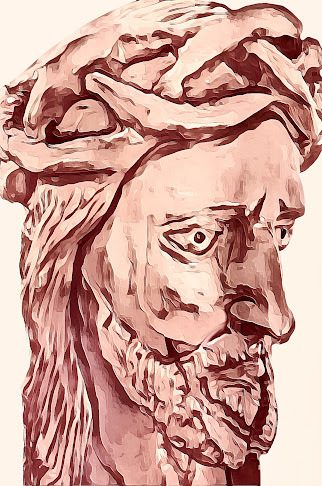 Let us not forget that courage above all has to do with the willingness to endure suffering; we must ask the Lord for the grace to endure much that is burdensome in the living of our faith in front of other persons—without condemning them, dehumanizing them, hating them, perpetrating violence against them. I have sinned so many times in this way: Lord have mercy on me, on all of us, on the whole world.
Let us not forget that courage above all has to do with the willingness to endure suffering; we must ask the Lord for the grace to endure much that is burdensome in the living of our faith in front of other persons—without condemning them, dehumanizing them, hating them, perpetrating violence against them. I have sinned so many times in this way: Lord have mercy on me, on all of us, on the whole world.The vocation of living the faith, of following Jesus, begins with allowing ourselves to see reality with the eyes of faith, to see the other person as loved by Jesus, to see Jesus identifying Himself with others in their suffering, their needs, their hunger and thirst for food and drink, for companionship and healing, for love.
What do we really know about them, about how to even begin to care for them? How will we know them, how will we know their specific, concrete needs, without listening to them, accompanying them, being open to receive—too—from their gifts that can touch our own poverty, and being willing to co-suffer with them, being vulnerable—in the measure God asks of us—to the awful abysses of their suffering?
Such living may well lead us to “make mistakes.” But mistakes will happen no matter how we live. We are not yet perfect; indeed we are far from it. What matters is that we stay with Jesus, follow Him, take “risks” for Him—risks to our comfort, our ego, our illusory sense of “safety.” But it is possible to live this way without the risk of “giving up” a single iota of the truth of our faith. On the contrary, this is the path by which our faith becomes “flesh,” takes on the real vitality of evangelization, begins to transform the world (and ourselves).
I don’t think I’m alone in saying that I’m afraid of these risks involved in the vocation of living my faith, of following Jesus. We need to beg Him for the grace to overcome this fear, to grow in courage and confidence by trusting in Him.
July 29, 2023
Everything For Which the Human Heart is Made
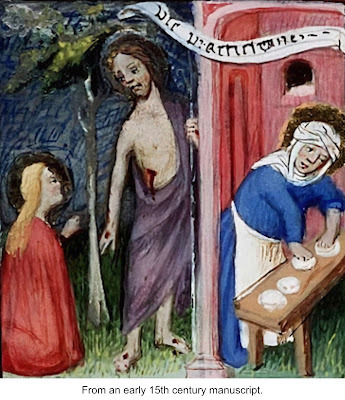 Today we commemorate those particular friends of Jesus during His earthly life, Saints Martha, Mary, and Lazarus. For this day, I want to post a selection from Spiritual Exercises of the Fraternity of Communion and Liberation in 2022, preached by the Abbot General of the Cistercians—Abbot Mauro-Giuseppe Lepori. That weekend in April-May 2022—which I was able to participate in from my bedroom thanks to live-streaming internet technology—was an extended meditation on today’s Gospel reading from the 10th chapter of Luke. Here we see, amidst the ordinary circumstances of domestic life, the radical origin of Saint Martha’s vocation to recognize in Jesus “the one thing necessary”—the One who enters into our lives of anxiousness and worry and reminds us that He is with us, that He wants to be with us.
Today we commemorate those particular friends of Jesus during His earthly life, Saints Martha, Mary, and Lazarus. For this day, I want to post a selection from Spiritual Exercises of the Fraternity of Communion and Liberation in 2022, preached by the Abbot General of the Cistercians—Abbot Mauro-Giuseppe Lepori. That weekend in April-May 2022—which I was able to participate in from my bedroom thanks to live-streaming internet technology—was an extended meditation on today’s Gospel reading from the 10th chapter of Luke. Here we see, amidst the ordinary circumstances of domestic life, the radical origin of Saint Martha’s vocation to recognize in Jesus “the one thing necessary”—the One who enters into our lives of anxiousness and worry and reminds us that He is with us, that He wants to be with us.This is true for each one of us, for every human person. Jesus’s words to Martha remind us of the reason why we exist, what we are made for, what gives meaning and value to every moment of life.
The selection from the Conference preached by Father Mauro-Giuseppe on Saturday morning, April 30, 2022 follows below in bold type:
“Martha, Martha, you are anxious and worried about many things. There is need of only one thing” (Luke 10:41-42).
Jesus repeated her name twice. What attention He showed her! What esteem! It is precisely like when God called Abraham to ask him to sacrifice Isaac (Genesis 22:1), or when He called Moses from the burning bush (Exodus 3:4); that is, in the crucial moments of salvation history. Or it is like when Christ called Saul of Tarsus, who was wholly intent on his mad mission of persecution: "Saul, Saul, why are you persecuting me?" (Acts 9:4)
Martha also found herself in front of the God who seizes you in the place where you think you possess your life and asks you to have a preference for Him. In that moment Abraham was sure he possessed his posterity forever. Moses encountered God in the burning bush, and Saul was sure that he was doing what was right and true, the rightest and truest thing a man can do. Right there, where you think you possess your own life, right there, God asks you to have a preference for Him.
Actually, He not so much asks you as proposes it to you. And immediately there is a mysterious attraction in God's proposal of Himself as the all of your life, as the life of your life. For this reason, Abraham even obeyed the proposal to sacrifice his son; Moses removed his sandals and approached the burning bush; Saul let himself be led like a baby and entrusted himself to the small Christian community of Damascus he had wanted to destroy.
For Martha it was the same call, brought down into her daily existence, but it was the same call. What difference of value can there be between the call of Abraham or Moses and that of this woman harried and busy in the kitchen, if the call comes from the same Lord and God? Actually, I would say that Martha's call was even more extraordinary, because the Eternal One did not call from heaven or a burning bush, or from Mount Sinai, but He was there, sitting in her house, there, speaking, a man like us who arrived tired and sweaty with dusty feet, and who then sat down to eat and drink like us. This is more extraordinary than the burning bush, more extraordinary than Mount Sinai smoking and trembling and causing the people to tremble.
As Jesus said of John the Baptist: “Amen, I say to you, among those born of women there has been none greater than John the Baptist; yet the least in the kingdom of heaven is greater than he” (Matthew 11:11). We are greater because the proposal God makes us in His incarnate Son is more extraordinary. The way God offers this proposal in the incarnate Son, and thus in the flesh, in the daily life of our human existence, is more extraordinary.
Martha’s kitchen, like the Virgin Mary’s little room or cave in Nazareth before it, were even more sacred places than the oaks of Mamre for Abraham, than Sinai for Moses, than Oreb for Elijah, because God had never been so present as He was in Jesus Christ. “And the Word became flesh and made His dwelling among us” (John 1:14); literally, came to “pitch His tent,” to place His tent in our midst, to set up His tent in our midst, to encounter us up close, familiarly, within our life, and in this way with disarming simplicity to offer us in Himself everything for which the human heart is made, of which the heart of every human being in human history is made.
When someone is surprised by this, by this event, like Martha that evening at the words of Jesus, what happens? What should be done? What reaction is asked of the freedom provoked and attracted by such a proposal of fullness made by God? For Martha, a journey, a following began. The Eternal One revealed to her that He is everything, not only in Himself (even the pagans knew this!) but for her, precisely for her “Martha, Martha!”—just as for Mary and Lazarus, as for Peter and the other apostles. Jesus was everything specifically for her!
But when Christ reveals Himself to us as the only One necessary, as the only One we need, this first of all asks a decision of us, because if it is true that I need only Him, then I can no longer separate myself from Him.
July 28, 2023
Moonrise, Sunset
The moon was rising in the evening sky, before darker clouds moved in, colored all along the horizon by the subtle reflected glow of the setting sun.
Here are two photographs and a piece of digital artwork.



July 26, 2023
My Granddaughter is a Toddler!
Here’s the latest “Papa and Maria” picture. Look how pretty she is!
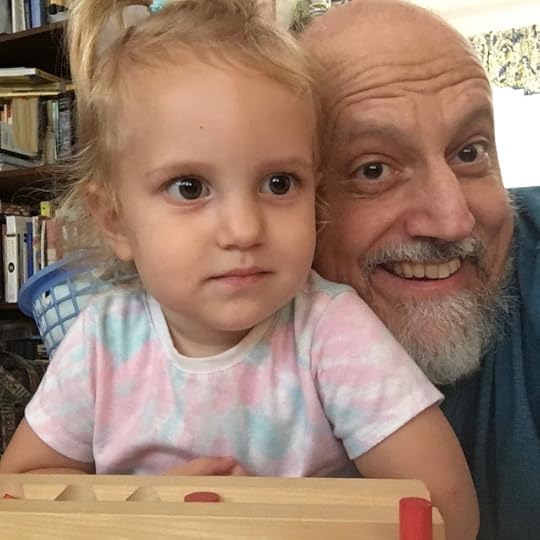
Maria is getting smarter every day. She knows lots of words, sings songs, counts, tries to imitate Jojo in Irish Dancing, and loves to have books read to her. She is sweet and cheerful (unless, of course, she doesn’t get her way☺️). She had a good attention span; here she is playing with an “educational toy” (not exactly a Montessori activity, but similar).

We celebrated her birthday while Lucia and Mike were visiting from New Jersey. Two years of Maria spreading joy through our whole family! May God continue to bless her for many many years!

July 25, 2023
Saint James, Apostle and Martyr
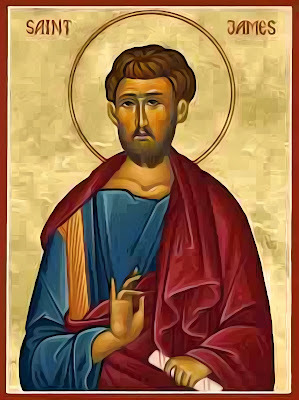 Happy Feast of Saint James the Apostle!
Happy Feast of Saint James the Apostle! Saint James, the brother of Saint John and the son of Zebedee, was the leader of the church in Jerusalem and the first of “the Twelve” to suffer martyrdom.
He was beheaded around 44 a.d., and the event is recounted in the New Testament: "King Herod laid hands upon some members of the church to harm them. He had James, the brother of John, killed by the sword" (Acts 12:2).
Today’s first reading is appropriate for this feast. The words of Saint Paul regarding the fruitfulness of the suffering of his own Apostolic ministry certainly apply to the blood shed by Saint James in Jerusalem nearly two thousand years ago. From the Holy Land (a land of too much conflict down the centuries even to the present day) to the Shrine of Santiago de Compostela in northern Spain on the threshold of the Atlantic Ocean (a place of pilgrimage for centuries which claims some of his relics) to the whole world of every place and time (to which he and his companions were originally commissioned to witness to Jesus Christ), Saint James’s witness and suffering continue to bear fruit, accompanied by the constant solicitude of his intercession.
“We hold this treasure in earthen vessels, that the surpassing power may be of God and not from us. We are afflicted in every way, but not constrained; perplexed, but not driven to despair; persecuted, but not abandoned; struck down, but not destroyed; always carrying about in the body the dying of Jesus, so that the life of Jesus may also be manifested in our body. For we who live are constantly being given up to death for the sake of Jesus, so that the life of Jesus may be manifested in our mortal flesh.
“So death is at work in us, but life in you. Since, then, we have the same spirit of faith, according to what is written— ‘I believed, therefore I spoke,’— we too believe and therefore speak, knowing that the one who raised the Lord Jesus will raise us also with Jesus and place us with you in his presence. Everything indeed is for you, so that the grace bestowed in abundance on more and more people may cause the thanksgiving to overflow for the glory of God” (2 Corinthians 4:7-15).July 23, 2023
“The Hills of July” (ongoing project)
 This should be easy, but it’s not.
This should be easy, but it’s not. Digital art technology (along with lots of literally “manual” labor) plus an overactive imagination has me obsessing over these old Blue Ridge mountains with their range of bright and dark hues that vary in sun, haze, clouds, and ominous approaching thunderstorms.
Anyway, I’m not playing games here, but trying to discover and work with the genuine artistic possibilities within these most recent developments in “new media.” They seem to be changing from one day to the next. I’m sure that I’m barely scratching the surface of this wildly manipulative explosion of visual technique.
Here are “the Hills of July” in all the varieties I’ve been working on. I’ll continue to put more pictures here, if I do any more on this theme. I’m not adding comments. That would go on forever. Let’s all just look:












July 22, 2023
Mary Magdalene: “A New Creation”
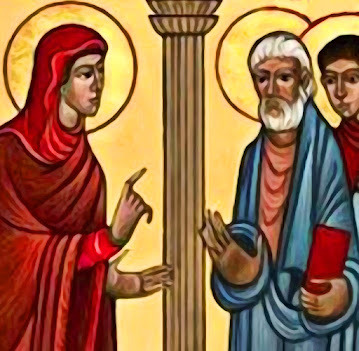 “The love of Christ impels us, once we have come to the conviction that one died for all; therefore, all have died. He indeed died for all, so that those who live might no longer live for themselves but for him who for their sake died and was raised. Consequently, from now on we regard no one according to the flesh; even if we once knew Christ according to the flesh, yet now we know him so no longer. So whoever is in Christ is a new creation: the old things have passed away; behold, new things have come” (Corinthians 5:14-17).
“The love of Christ impels us, once we have come to the conviction that one died for all; therefore, all have died. He indeed died for all, so that those who live might no longer live for themselves but for him who for their sake died and was raised. Consequently, from now on we regard no one according to the flesh; even if we once knew Christ according to the flesh, yet now we know him so no longer. So whoever is in Christ is a new creation: the old things have passed away; behold, new things have come” (Corinthians 5:14-17).So we read on this feast of Saint Mary Magdalene, “apostle to the apostles,” who encountered the Risen Jesus in the “Garden” near His empty tomb. The love of the Risen Christ impelled her to announce this good news to the apostles, to proclaim the beginning of a New Creation.


July 19, 2023
Blooming in the Sun
Asia and the Americas have had more interaction through the centuries than we realize.

July 15, 2023
Saint Bonaventure on Progress as “Renewal in Continuity”
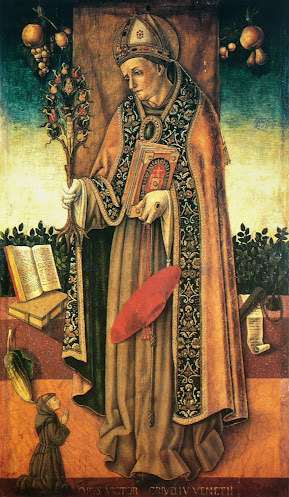 The late Pope Benedict XVI drew much inspiration from the Augustinian theological tradition and had a special affection for Saint Bonaventure (Feast, July 15), writing his doctoral dissertation on Bonaventure’s theology of history. In the brief selection below from the second of three homilies on Saint Bonaventure in his series of Wednesday audiences devoted to Medieval Doctors of the Church, Pope Benedict emphasizes Bonaventure’s profound conviction that the life of the Church develops and grows even as it remains rooted in Jesus Christ and His Gospel as handed on from the Apostles.
The late Pope Benedict XVI drew much inspiration from the Augustinian theological tradition and had a special affection for Saint Bonaventure (Feast, July 15), writing his doctoral dissertation on Bonaventure’s theology of history. In the brief selection below from the second of three homilies on Saint Bonaventure in his series of Wednesday audiences devoted to Medieval Doctors of the Church, Pope Benedict emphasizes Bonaventure’s profound conviction that the life of the Church develops and grows even as it remains rooted in Jesus Christ and His Gospel as handed on from the Apostles.Saint Bonaventure saw that the charism of his teacher Saint Francis of Assisi represented a new “moment” in the history of the Church. Nevertheless, it did not represent a break with the past, but rather a coherent unfolding of the inner vitality of Christian faith and life. One might say—as Pope Benedict often emphasized regarding the Church today—that it was a moment of “renewal in continuity.” Bonaventure viewed the rise of the mendicant orders as a deepening of the Church’s own understanding of the “inexhaustible riches” of the revelation of God’s love given in Christ and handed on in the Church’s living tradition. The works of Christ “do not fail but progress” in the Church’s earthly pilgrimage through history in union with His fullness.
Here Pope Benedict summarizes the great thirteenth century Saint’s approach to the conflicts he faced as Minister General of the rapidly growing Franciscan order in its still-early days:
“Jesus Christ is God's last word—in him God said all, giving and expressing himself. More than himself, God cannot express or give. The Holy Spirit is the Spirit of the Father and of the Son. Christ himself says of the Holy Spirit: ‘He will bring to your remembrance all that I have said to you’ (John 14:26), and ‘he will take what is mine and declare it to you’ (John 16:15). Thus there is no loftier Gospel, there is no other Church to await. Therefore the Order of St Francis too must fit into this Church, into her faith and into her hierarchical order.
“This does not mean that the Church is stationary, fixed in the past, or that there can be no newness within her. ‘Opera Christi non deficiunt, sed proficiunt’: Christ's works do not go backwards, they do not fail but progress, the Saint said in his letter De Tribus Quaestionibus. Thus St Bonaventure explicitly formulates the idea of progress and this is an innovation in comparison with the Fathers of the Church and the majority of his contemporaries.
“The Franciscan Order of course as he emphasized belongs to the Church of Jesus Christ, to the apostolic Church, and cannot be built on utopian spiritualism. Yet, at the same time, the newness of this Order in comparison with classical monasticism was valid and St Bonaventure…defended this newness against the attacks of the secular clergy of Paris: the Franciscans have no fixed monastery, they may go everywhere to proclaim the Gospel. It was precisely the break with stability, the characteristic of monasticism, for the sake of a new flexibility that restored to the Church her missionary dynamism.”
~Pope Benedict XVI (General Audience, March 10, 2010)



